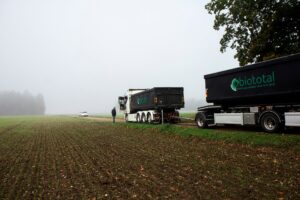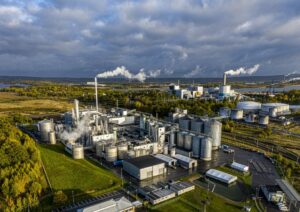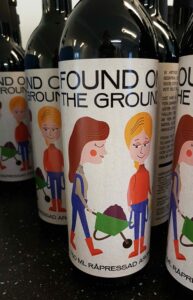The demand for a sustainable industry is increasing, pushing companies towards more circular business models. There are several Swedish companies that have a circular business model as their core, some of which are located in the east of Sweden. By finding new purpose for old materials, they help cut emissions and makes our planet a little greener.
Used materials finding a new purpose
Some used materials might seem like they have served their purpose. Biototal is a company that works to reuse bi-products and residues from both agriculture and industrial production. Their vision is to contribute to a better environment, develop long-term sustainable solutions in resource efficiency and at the same time create economic value for the parties involved.
Biototal’s business ensures that the agricultural and industrial products that are consumed in the cities are returned to arable land, without risk to health and the environment. This is enabling the development of long-term sustainable circulation between city, land and sea.

Source: Biototal Norden AB
The focus is to find effective system solutions via expertise in areas such as environment, chemistry, biology and agronomy. For instance, Biototal’s award-winning quality process allows them to turn sludge from wastewater treatment into nutrients that benefit growth on Swedish farmland. Additional products are bio fertilizer from the production of biogas, as well as ammonium sulfate (a local industrial by-product) which are used as fertilizers.
In recent years, different residue products were taken care of and returned to approximately 20 000 ha of land. The collective yearly environmental value amounts to 300 000 tonnes of CO2 eq. reduction by replacing artificial fertilizers with renewable bio-nutrients.
Industrial and urban symbiosis to make use of resources
To be able to use as many of the resources available as possible, collaboration is key. At Händelö, situated just outside the city of Norrköping, Sweden they do just that. With land, rail and sea-based access, Händelö was a logical choice for Lantmännen Agroetanol to locate their ethanol factory in 2000. The neighbouring combined heat and power plant could offer competitive energy prices, but the critical point was that E.ON fueled their plant mainly by a renewable fuel mix. The combined outcome is that Lantmännen Agroetanol produces several things from this cooperation; namely, bio ethanol fuel for transportation, protein-rich animal feed and carbonic acid for the soft drink market.

Händelö eco-industrial park. Source: heip.se
Industrial and urban symbiosis is a phenomenon that mainly has been driven by academic researchers. Today, symbiotic energy and material resource streams between industry and city are crucial in transforming society towards a more bio-based and circular economy. At Händelö Eco-Industrial Park, the actors make sure to utilize industry and city surplus resources in a synergetic network of actors who are proud to display innovation and knowledge about green renewable resource efficiency.
The Park currently uses 98% renewable energy sources, which is a 70 % reduction of CO2 emission, compared to a biorefinery relying entirely on fossil fuels.
Händelö Eco-Industrial Park is a project-driven effort to show and communicate industrial cooperation financed by the main actors and the European Development Fund. The main actors are beside the above-mentioned industries, Norrköping Municipality, Port of Norrköping, NODRA and Linköping University.
New inventions from old products
Using old resources can be made on a bigger scale, like the Händelö Eco-industrial park, but smaller, local producers are just as important in the shift to a more circular economy. The largest supplier of pickled cucumber in Sweden, Kinda Gurka, wastes 250 000 litres of cucumber-broth yearly. By joining forces with a local dairy, which had leftovers in the form of buttermilk, they innovated a new form of cheese – A fresh cottage cheese, called Kärno, with a small taste of cucumber. Since all inputs that are used to create Kärno already exist, customers can enjoy a new product with a low impact on the environment.

Bottles from Found on the Ground. Photo: Sofia Fälth
The same goes for the company Found on the ground, which takes care of unused local resources and sells these back to the market as refined products. The company collects the Aronia berry in local gardens and presses them into a deep red, intense drink. By also taking care of the remains, which are carefully dried and ground into powder; Found on the ground has a production without any waste, making the smallest possible impact on the environment. The raw material is being picked in Östergötland, and largely going back to the same area – but also other parts of Sweden.
In today’s society where much is about constant economic growth and increased efficiency, other essential aspects of life might be lost. Found on the ground is a countermovement, where the slowness of collecting and production is a conscious and stubborn choice. As far as possible, the company only buy used products such as machines, work clothes, packaging materials and freezers. These companies might be small or big, but they are all part of the shift to a more circular society.